- Home
- Ian McDonald
Luna--Wolf Moon--A Novel Page 7
Luna--Wolf Moon--A Novel Read online
Page 7
Lucas Corta pulled on the webbed socks and gloves. He pawed air, trod air. Vorontsovs. Always that sneer at the incompetence and inability of people trapped on worlds. Lucas was sick of being the incompetent man. He launched himself from the elevator into the hub. Even lunar leg muscles were too strong for the fractional gravity of the core. Lucas spread his hands, caught air in the webbing, paddled backwards against his direction of flight. He flexed his toes and spread his flippers as an air brake. This was easy. Instinctual. He came to a rest in the centre of the cylinder. The ship’s axis of rotation. Zero gee. Lucas spun slowly, a human star.
He kicked and pushed at air. He wasn’t moving. He convulsed his entire body as if the power of spasm alone might break him free from the gravity trap. Lucas could hear laughter from the elevator door. He convulsed again. Nothing. Lithe figures in fluorescents dived sleekly towards him from the further lock. Two young women in tight flight suits, hair carefully netted, bracketed Lucas and came to abrupt stops.
‘Do you need any help, Senhor Corta?’
‘I can get this.’
‘Hold this line, Senhor Corta.’
The woman in the pink suit fastened the line to her work belt and plunged away. The snap of the line almost tugged it from Lucas’s grasp. He was moving. He was flying. He could feel air on his face, in his hair. It was thrilling. The second ship-girl swam beside him. He noticed the vacuum cleaner on her belt.
In the lock to Valery Vorontsov’s private chamber he thanked the young women for the exciting ride.
‘Mind the branches,’ was their only advice.
Valery Vorontsov’s audience chamber at the heart of Saints Peter and Paul was a cylindrical forest. Lucas floated in a tunnel of twigs and leaves. He could not see the walls, so densely packed were the branches. Down there must be trunks, roots, the aeroponics that sustained this free-fall forest. The humidity, the notes of growth and rot were familiar to Lucas – the intimate perfume of Twé – but there were new notes he only recognised from his bespoke gins: juniper, pine, florals and botanicals. The forest was lit from deep among the roots, but the trees were adorned with thousands of bio lamps. Stars above, stars on either hand, stars below. It took a few seconds for Lucas to acclimatise to the gloaming, then he saw that the leaf canopy had been sculpted into undulations and spirals, crests and waves. A tree scape. Occasional solitary branches lifted above the topiary, trained and gnarled, holding a precisely trimmed raft of leaves like an offering. Lucas’s eyes adapted fully to the light and he saw a figure at the centre of the free-fall forest. Something glimpsed, half hidden by the leaves, slow moving, deliberate.
A line ran along the centre of the cylinder. Lucas hauled himself toward the figure. A man – no, he realised as he drew closer: a thing like a man. That had once been a man. His back was to Lucas, he worked diligently on the foliage with hand-held shears, clipping, snipping, shaping. A halo of conifer trimmings surrounded him. Lucas smelled fresh taints among the resin and leaf: urine. Fungal infections.
‘Valery Grigorivitch.’
The man-like thing turned to confront the interruption. A life in micro gee had shaped his body as surely and irrevocably as he had shaped his forest. His legs were twisted spindles; ribbons of withered muscle. His chest was heroic in width and girth but Lucas could see from the way it filled the compression shirt that there was no depth, no strength in it. Ribs stretched the tight material. The breast bone was sharp as a blade. His arms were long and wire-sinewed. His head was enormous, a human face annealed to a skin balloon. A frieze of silver hair around the base of the skull only emphasised its size. A double tube ran from the occipital bones to a free-floating pump. A second set of tubes ran from his left flank to a cluster of full colostomy bags, turning in the zero gee.
This was what half a century in micro-gee did to a human body.
‘Lucas Corta.’
‘An honour, sir.’
‘Is it? Is it?’ Valery Vorontsov took a vacuum cleaner from his tool belt and with the deftness of decades sucked up the floating tree clippings. ‘I’ve never met another Dragon. Did you know that?’
‘No longer a Dragon, sir.’
‘I heard that. Nonsense, of course. It’s in the genes. This is a novelty for me. And for you.’
‘Valery Grigorivitch, I need to ask…’
‘Oh, hold your hideous asking. I know what you want. We’ll see if the universe lets you have it. But that’s the thing, isn’t it? Always asking questions of the universe. Lucas Corta, have you ever seen such a thing as this?’
Valery Vorontsov waved his shears at the starlit forest.
‘I don’t think anyone has, sir.’
‘They haven’t. Do you know what this is? It’s a question I asked the universe. How would a forest grow in the sky? That’s a question to ask. Here is the answer. It never stops growing, never stops changing. I work on it; I shape it to my will. It’s slow sculpture. It will outlast me. I like that. We are such self-absorbed creatures. We think ourselves the measure of everything. Time will take away everything we are, everything we have, everything we will ever build. It’s good to think beyond our own lifetimes. Maybe my forest will last a million years, maybe a billion. Maybe it will end in fire when the sun burns. When I die my elements will pass into root and branch and leaf. I will become one with it. That gives me great comfort.’
Valery Vorontsov unhooked the collection bag from the vacuum and sent it flying down-cylinder. A Zabbaleen bot darted from the foliage to snatch the refuse and shepherd it to the lock.
‘My mother was a supporter of the Sisterhood of the Lords of Now,’ Lucas said. ‘Their mission is worked out over decades, centuries even.’
‘I am aware of the work of the Sisterhood. You’re not a believer, Lucas Corta?’
‘It involves supernatural agency. It’s impossible for me to believe it.’
‘Hm. I hear you want to go to earth. That’s a desire, not a question. The universe does not owe us our desires, but it may grant a good question. What is your question?’
‘How can I take back what was stolen from my family?’
‘Hm.’ Valery Vorontsov broke off a branch tip, sniffed it, offered it to Lucas. ‘What do you think of that? That’s real juniper. All you’ve ever smelled is synthetic. Those Asamoahs, I know what they can do. They play with DNA. They swap genes around. Childish. I create an environment and let life respond to it. I grow real juniper in the most artificial environment humanity has ever created. No no no, Lucas Corta, that question will not do at all. The right question is, how can a moon-born man go to Earth and survive?’
‘Dr Volikova is developing a training scheme for me.’
‘If the re-entry doesn’t kill you. If your heart doesn’t give out in the acclimatisation suite. If you don’t die of sunburn. If a million allergies don’t swell you up like a colostomy bag. If terrestrial gut bacteria doesn’t turn you inside out. If the pollution doesn’t tear out your soft little lungs. If you can sleep down in that gravity hole without apnoea waking you every five minutes; between the nightmares.’
‘If we listened to ifs, we wouldn’t be dragons,’ Lucas said. The two men had subtly, unconsciously matched orientations to float face to face.
‘As you said, you’re not a dragon any more. You’ll be less than that on Earth. The Moon is not a state. The Moon is an offshore industrial outpost. You’ll have no papers, no nation, no identity. You will have no legal existence. You won’t know the rules, the customs, the laws. There are laws. They will apply to you but you’ll know nothing about how they work. They are like gravity. You are subject to them. You can’t negotiate with them. You have no power to negotiate.
‘No one will know who you are. No one will care that you’re the man from the moon. You’re a freak, a ten day wonder. No one will respect you. No one will take you seriously. No one needs anything from you. No one wants what you have. You’re an intelligent man. You worked this out while you were still in the capsule. And yet I find you here, wit
h your plan and the favours you need from me and whatever it is you have that you believe can persuade me to grant them to you.’
Each of Valery Vorontsov’s refutations was a nail through a finger, through a foot, through a hand and a knee and a shoulder. Mortifications. Lucas Corta had never understood guilt or remorse. Pride was his virtue. Pride tugged against those nails, tore him free from them. Their pain was nothing to what he had lost.
‘I can’t argue with you, Valery Grigorivitch. I have nothing to offer and nothing to bargain with. I will need your support, your ships, your mass-driver and all I can do is talk.’
‘The universe is full of talk. Talk and hydrogen.’
‘The Asamoahs think you’re inbred monstrosities. The Mackenzies marry you for shipping rights but they engineer your DNA out of their children. My own family thought you were drunken clowns. The Suns don’t think you’re even human.’
‘We don’t need respect.’
‘Respect buys no air. I’m offering something more tangible.’
‘You have a thing to offer? Lucas Corta, who has lost his business, his family, his wealth and his name?’
‘Empire.’
‘Let’s have your talk, Lucas Corta.’
* * *
‘All the way?’ Dr Volikova said.
‘All the way,’ Lucas Corta said. The corridor curved steeply upwards before him. The ceiling was a low, close horizon. ‘Walk with me.’
Dr Volikova offered an arm. Lucas pushed it away.
‘You shouldn’t even be on your feet, Lucas.’
‘Walk with me.’
‘All the way.’
‘I am a systematic man,’ Lucas Corta said. Even in the lunar gravity of the inmost ring, each step sent wrenching pain from his ankles to his throat. ‘I have very little imagination. I must have a plan. A child walks before she runs. I walk the lunar ring, I run the lunar ring. I walk the intermediate ring, I run the intermediate ring. I walk the terrestrial ring, I run the terrestrial ring.’
Lucas’s steps were sure and purposeful now. Dr Volikova was a touch away. Lucas noticed a betraying flicker in her eyes. She was reading data from a lens.
‘Are you monitoring me, Irina Galinova?’
‘Always, Lucas.’
‘And?’
‘Walk on.’
Lucas bit down his smile of small victory.
‘Did you listen to that playlist?’ he asked.
‘I did.’
‘What did you think of it?’
‘It’s more sophisticated than I thought.’
‘You didn’t say it sounds like mall music. I’m hopeful.’
‘I hear the nostalgia, but I don’t quite understand the saudade.’
‘Saudade is more than nostalgia. It’s a kind of love. It’s a loss and a joy. An intense melancholy and joy.’
‘I should think you would understand that well, Lucas.’
‘One can have saudade for a future event.’
‘You never give up, do you?’
‘No I don’t, Galina Ivanovna.’
His joints were loosening, the pain easing, the stiffness working free.
‘Your heart rate and blood pressure are up, Lucas.’
He looked up the curving corridor.
‘I’m going to finish this.’
‘Okay.’
Another small win.
Lucas stopped.
On again, up the curve of the world. Lucas’s lungs were tight, his breath caught, his heart ached as if seized in a fist. Twenty metres ten metres five metres to the door to the med centre. Finish it. Finish it.
‘It’s customary,’ Lucas panted. His words were brief, tight gasps. He leaned against the door lintel and looked back up the curving corridor. ‘When offered. A playlist.’ He could barely speak. A hundred metres under his own native lunar gravity, and he was clinging, gasping, aching. The damage was deeper than he had imagined. Fourteen lunes of intensive training seemed insurmountable. ‘To offer a playlist. Of your own in return.’
‘The Bill Evans?’ Dr Volikova said.
‘And more in that style. I believe it’s called modal jazz. Curate it for me. Take me on a journey through jazzland. I’ll need something to get me through the training.’
* * *
He woke in his capsule, flicked the lights on. Creakings and rattlings. The sleep pod was shaking. The ship was shaking. The pod lurched. Lucas grasped the hand rails, gripped tight, tighter until his nails dug into his palm. The pod lurched again. Lucas cried out. He felt the world drop beneath him. There was nothing to hold on to. And this was no world. This was a ship, a spinning top of aluminium and construction carbon. He was a man in a pod in a wheel in a tiny ship out beyond the far side of the moon.
‘Toquinho,’ he whispered. ‘What’s happening?’
The ship dropped under him again. Lucas gripped the solid, useless hand rails. The voice in his implant was unfamiliar, strangely accented. Saints Peter and Paul was too small to run a full network.
I’m making a series of course correction burns, Toquinho said. My orbit is stable and predictable up to eleven years. Small periodic corrections every ten or so orbits push that window of predictability forward. These occur around the second perilune in a two-encounter orbit. The process is fully controlled and quite routine. I can supply schematics if you wish.
‘That won’t be necessary,’ Lucas said and the shaking, the jolting, the terrible terrible feeling of falling into nothing forever ended. Saints Peter and Paul spun around the moon and the moon threw it towards the blue gem of earth.
Toquinho chimed. Files from Dr Volikova. Lucas opened them. Music: lunes-worth. A journey.
* * *
In the first three lunes Lucas explored hard bop; its language and instrumentality, its identity and tonality, its triadic harmonies and plagal cadences. He learned the names of its heroes. Mingus, Davis, Monk and Blakey: these were his apostles. He studied the key recordings, its Gospels and Acts. He learned how to listen, what to listen for, when to listen for it. He traced its roots in bebop and how it both revolted against that movement and sought to reform it. He ventured into heterodox realms where the distinctions between funky jazz and soul jazz and the divorce between west coast cool jazz and east coast hard bop became schisms in the musical cosmos. It was the worst possible music to train to. Lucas loved it. He despised training. It was difficult and boring. Carlinhos had evangelised muscle burns and dopamine highs and hormonal stress releasers. What lifted Carlinhos into the transcendental made Lucas paranoid and furious.
He came out of the gym blazing with rage, snappy with anyone who so much as glanced at him, went to bed aching and edgy and dreading the next day’s routine. Five hours. Six truths sent him back in the gym, Art Blakey on play. Carlinhos and his endorphins was dead. Rafa was dead. Ariel was in hiding. Lucasinho was under the protection of AKA. Boa Vista was an airless ruin and this ship, Saints Peter and Paul, was carrying stolen Corta helium-3 containers to the fusion reactors of Earth. So he trained. Hard bop was a place beyond the endless track of the treadmill, the ticked-off repetitions of weights, the indignities of toning. Hard bop was a time beyond the tick of days tocking into lunes. A year of this routine was endless; it must be broken down into a succession, not of sessions, sleeps, days, orbits, but of acts. A thing conceived, begun, worked through, completed. Then another. Then another. Quantised. The year-and-some would be measured not by the gradient of ever-heavier weights, ever better personal bests, nor the growing strength and resilience of his body, but by quanta of new music. After hard bop he would learn modal jazz, then move through free jazz to Afro-Cuban and Brazilian jazz which would circle back into his adored bossa nova. The next time he would listen to bossa nova, his feet would be on earth under an open sky. But in those first few orbits hard bop was a high, clear horizon; further and wider than any of the moon.
After half a lune he ran the inmost ring. All the way. After a lune he walked the intermediate ring, half an Earth gee, three lun
ar gravities. He walked without aid or support or pause and it took him an hour to complete. After two lunes he ran the mezzanine ring. After three lunes, Lucas Corta slept there. The first night he felt a brass demon crouch on his chest and shit molten lead into his heart and lungs. The second night, the third the fourth. After fifteen nights he slept a full night with only nightmares of being trapped beneath the iron ice of a steel sea. After that he slept in three lunar gravities every night.
The second three lunes Lucas Corta explored modal jazz – Dr Volikova’s passion. His steps into the music were more certain; he had glimpsed this terrain from another country and knew where its ranges stood, where its river flowed. Geographical metaphors had meaning for him now, for the progression to modal jazz accompanied Lucas turning his attention to Earth. Here was a subject to contain a lifetime. Geography, geology, geophysics. Oceanography, climatology and their daughter meteorology. The interrelationships of water, heat, spin, thermodynamics and the beautiful and chaotic systems spun out from such basic elements enchanted him. Rich, unpredictable, perilous. He loved to read the meteorological reports and see their predictions drawn out in white and grey across the blue eye of the planet before him. Lucas Corta was an avid Earth watcher. He observed storms and hurricanes wheel across oceans; dun plains change to green as rains swept them, deserts darken in blossom, marshes and sundarbans vanish under twinkling floods. He watched seasons creep out from the poles as he cycled around the planet, lune by lune. He watched snow come and snow retreat and the rich darkness of the monsoon spread across parched millions.
One thing he would not watch, and that was the Earth encounter, when the cycler exchanged personnel capsules with the orbital tether and dropped cargo pods for controlled splashdown. In his cabin he felt the shudder of capsules and attachments releasing, the jolt of transfer pods docking but he would never join the spectators in the observation bubble. He would not grace plunder with his attention. He never once looked back at the moon.
Early in the year of orbits Dr Volikova was transferred to Earth on leave to St Petersburg. Her replacement was Yevgeny Chesnokov, a cocksure thirtysomething who could not understand why Lucas disdained him. He was over-familiar, his manners would have had him knifed in any cafe in João de Deus and his taste in music was execrable. Beats did not make music. Beats were easy. Even Toquinho, in its limited state, could invent a new beat. Lucas had grown accustomed to the new, flat character of his familiar. One ship, one voice, one interface. If Toquinho now talked of itself as Saints Peter and Paul personified, its hesitations and pauses made that sound less than omniscient. The speed-of-light lag made real-time access to Earth’s libraries difficult but the cycler’s system held enough information for Lucas to structure his research. He let his geophysical and climatological knowledge of the planet lead him into the geopolitical. Earth was undergoing a climate shift; it underpinned every aspect of the planet’s politics, from decades-deep drought in the Sahel and Western USA to the perpetual storms striking north-west Europe, flood after flood after flood. Lucas could not understand the folly of living on a world that was not under human control.

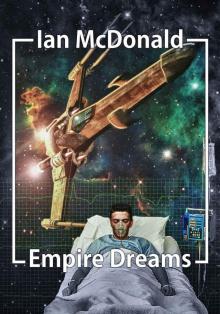 Empire Dreams
Empire Dreams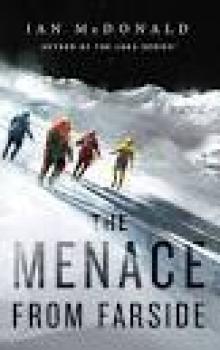 The Menace from Farside
The Menace from Farside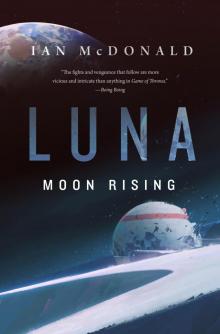 Luna: Moon Rising
Luna: Moon Rising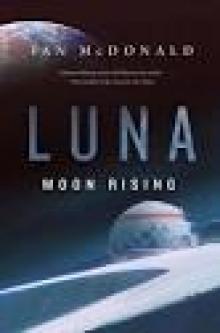 Moon Rising
Moon Rising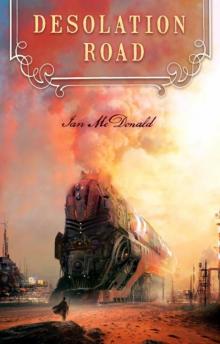 Desolation Road dru-1
Desolation Road dru-1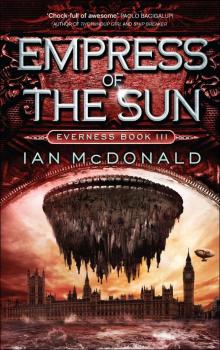 Empress of the Sun
Empress of the Sun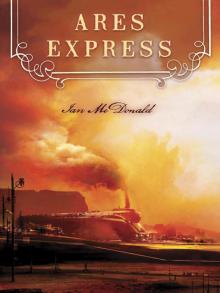 Ares Express dru-2
Ares Express dru-2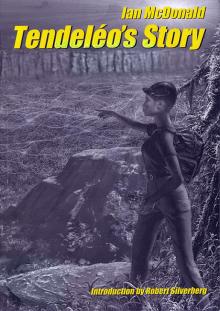 Tendeléo’s Story
Tendeléo’s Story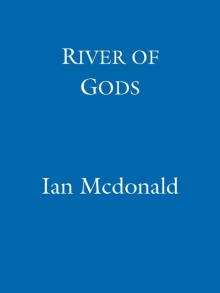 River Of Gods
River Of Gods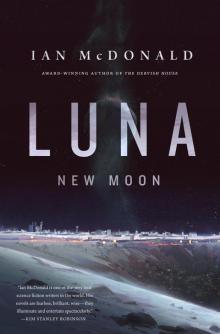 Luna
Luna![Cyberabad Days - [River of Gods 02] Read online](http://i1.bookreadfree.com/i1/03/29/cyberabad_days_-_river_of_gods_02_preview.jpg) Cyberabad Days - [River of Gods 02]
Cyberabad Days - [River of Gods 02]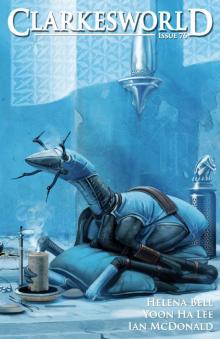 Clarkesworld Magazine Issue 76
Clarkesworld Magazine Issue 76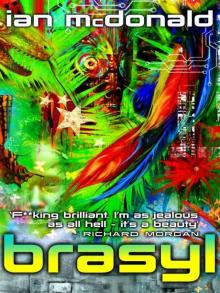 Brasyl (GollanczF.)
Brasyl (GollanczF.)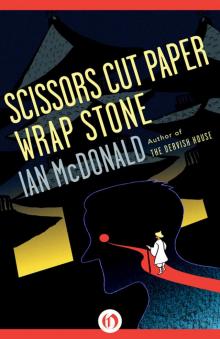 Scissors Cut Paper Wrap Stone
Scissors Cut Paper Wrap Stone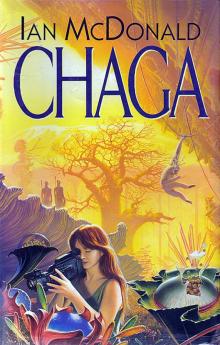 Chaga
Chaga Time Was
Time Was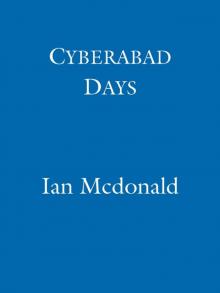 Cyberabad Days
Cyberabad Days Be My Enemy
Be My Enemy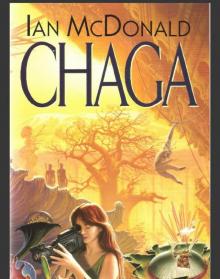 Changa
Changa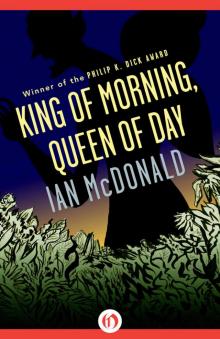 King of Morning, Queen of Day
King of Morning, Queen of Day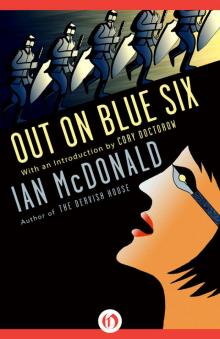 Out on Blue Six
Out on Blue Six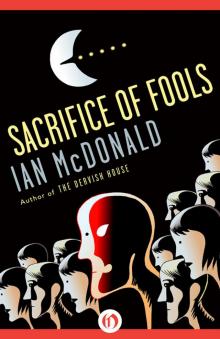 Sacrifice of Fools
Sacrifice of Fools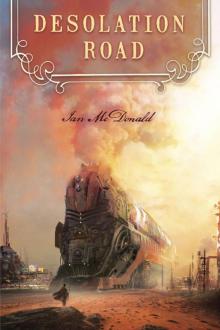 Desolation Road
Desolation Road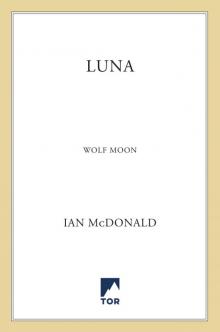 Luna--Wolf Moon--A Novel
Luna--Wolf Moon--A Novel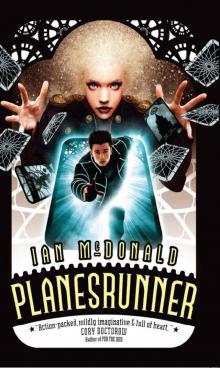 Planesrunner (Everness Book One)
Planesrunner (Everness Book One)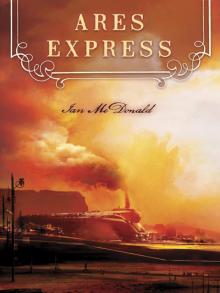 Ares Express
Ares Express